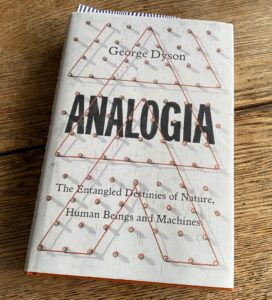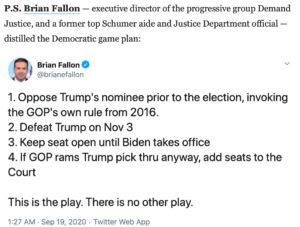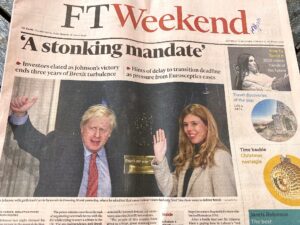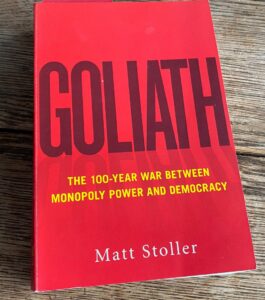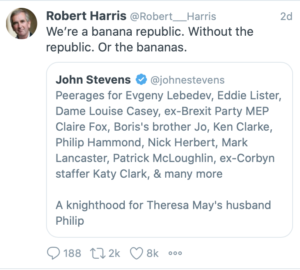Quote of the Day
”I often think how much easier the world would have been to manage if Herr Hitler and Signor Mussolini had been at Oxford.”
- Lord Halifax, Neville Chamberlain’s Foreign Secretary.
Er, note that he said Oxford, not Cambridge.
Musical alternative to the morning’s radio news
Haydn String Quartet No. 62, Op. 76 No. 3 “Emperor” (2nd mov) Veridis Quartet (Live performance)
Can democracies stand up to Facebook? Ireland may have the answer
This morning’s Observer column:
Last month, the Irish data protection commissioner (DPC) sent Facebook a preliminary order ordering it to stop sending the data of its European users to the US. This was a big deal, because in order to comply with the ruling, Facebook would have to embark on a comprehensive re-engineering of its European operations, or to shut down those operations entirely, at least for a time.
Such a shutdown would of course be traumatic for the poor souls who are addicted to Facebook and Instagram, but it would be even worse for the company – for two reasons. The first is that it makes more money from European users’ data – an average of $13.21 (£10.19) per user in 2019 – than from any other territory except the US (where it earns $41.41 per user); the second is that failure to comply could land it with a fine of up to 4% of its global revenue, which in Facebook’s case would come to about $3bn. Given the scale of its revenues, that’s not a showstopper, but it would nevertheless be annoying.
Predictably, the company was furious, threatening, as one commentator put it, “to pack up its toys and go home if European regulators don’t back down and let the social network get its own way”…
How to debate against a liar
The first Presidential debate is coming up on Tuesday.
Richard A. Friedman is a professor of clinical psychiatry. He has [some advice] (https://www.nytimes.com/2020/09/25/opinion/debate-trump-biden-lie.html) for Joe Biden on how to handle Trump.
When Joe Biden debates President Trump on Tuesday, he will have to figure out how to parry with an opponent who habitually lies and doesn’t play by the rules.
As a psychiatrist, I’d like to offer Mr. Biden some advice: Don’t waste your time fact-checking the president. If you attempt to counter every falsehood or distortion that Mr. Trump serves up, you will cede control of the debate. And, by trying to correct him, you will paradoxically strengthen the misinformation rather than undermine it. (Research shows that trying to correct a falsehood with truth can backfire by reinforcing the original lie. )
Instead, Biden should use more powerful weapons that will put Trump on the defensive.
The first weapon may be the most effective: humor and ridicule.
Trump, faced with a pandemic and an economic downturn, tells Americans what a great job he’s done. In response, Mr. Biden should smile and say with a bit of laugh: “And just where have you been living? South Korea? Or Fiji? You cannot be in the United States — except maybe on the golf course. We’ve got about 4 percent of the world’s population and 21 percent of all Covid deaths and the highest unemployment since the Great Depression! You must be living on another planet!”
The retort mocks the president as weak and unaccomplished, which will rattle him. He is apparently so fearful of being the target of a joke that — unlike any president before him — he has skipped the last three roasts at the White House Correspondents Dinner.
Lots more in that vein. Professor Friedman also comes up with something I hadn’t thought about: there won’t be a live audience.
President Trump will not have a live audience to excite him and satisfy his insatiable need for approval and attention, which means he will be even more vulnerable to a takedown. True, no one will be there to laugh at Mr. Biden’s jokes, but it doesn’t matter because the goal is serious: to expose the truth and unnerve Mr. Trump by getting under his skin.
Interesting piece throughout.
Project Orion
One of the most interesting and unusual books I read during lockdown is George Dyson’s Analogia: the Entangled Destinies of Nature, Human Beings and Machines. In one section of it he describes an extraordinary, top-secret project that his father, the great physicist Freeman Dyson, had worked on in the late 1950s — the Orion Project. Crudely summarised, this was a project to build a huge spaceship powered by a large number of successive nuclear explosions. It sounds so daft that I have doubts even as I type the words. But the project was real (fuelled in part by post-Sputnik panic in the US) and prototypes were built and tested, though most of the information about it was highly classified until George Dyson campaigned vigorously to have it released.
Anyway, I finished the book wondering what else was known about Project Orion, and — lo! and behold! — look what I found: a wonderful 2002 BBC documentary, To Mars By A Bomb – The Secret History of Project Orion, about it.
It’s nearly an hour long, so make some coffee, pull up a chair, and ponder the exquisite madness of ultra-clever human beings.
This blog is also available as a daily email. If you think this might suit you better, why not subscribe? One email a day, delivered to your inbox at 7am UK time. It’s free, and there’s a one-click unsubscribe if you decide that your inbox is full enough already!
